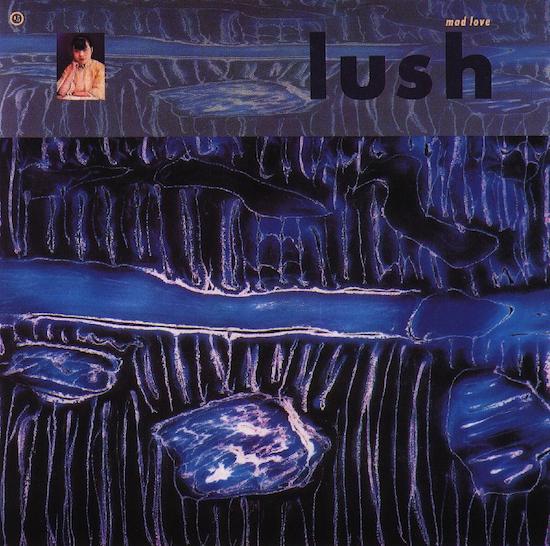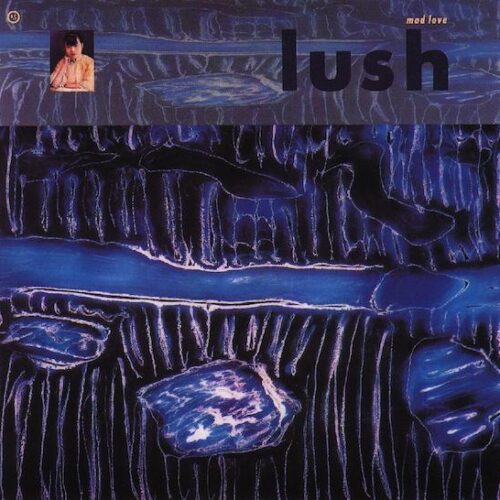Remember that saying about the ‘tree falling in the forest’, and how if no one was around to hear it, did it make a sound? While many lesser bands have their unconditional place in the hearts and minds of the ‘serious’ critical rock community, Lush are often viewed as an interesting footnote to Britpop or an ornate question mark to the genre known as ‘Shoegazing’. They’re often deemed unworthy of serious discussion, repeatedly sidelined for commentaries on Ride, Slowdive, Chapterhouse, Echobelly, Elastica – anyone, in fact, but them.
Perhaps you’ve only heard their bid-for-the-charts album before they broke up, and decided it was too saccharine for your particular cup of tea. Possibly you’ve noticed the pretty boy, pretty girl coupling that made them seem almost manufactured, and looked no further.
Bassist Phil King (ex-Felt & currently in the Jesus & Mary Chain) agrees that the tide seems to be turning and cites the 20-year rule: that sometimes it takes that long for people to realise something’s true worth. Miki Berenyi (her of trademark postbox-red hair, and Japanese/Hungarian origins) thinks she’ll be dead before someone says something nice about Lush.
So, I’m going to say something nice.
My point is this: not doubting that My Bloody Valentine are as seminal as is often said, the musical legacy of Lush – in my opinion – should be set in similar stone to that of Kevin Shield’s lot. As controversial as that is, Lush, I think, match My Bloody Valentine in terms of sheer power, sublime pop ingenuity and sonic emotiveness. I tread carefully. But I make this supposition based on the evidence of about twenty or so epic and spellbinding gems scattered about their short career.
Scrutinise both groups for signs of creative prodigiousness, and I’m not so sure you’d pick My Bloody Valentine as the obvious shoo-ins. I’m thinking outstanding highlights from Lush’s two 4AD albums, Spooky (1992) and Split (1994). Or those earlier mesmerising EPs with superlative, shiver-down-your-spine productions crafted by Tim Friese-Greene or The Cocteau Twin’s Robin Guthrie. Jeff Buckley, I’m informed, loved ‘Scar’ especially.
Some may still think it perverse to position Lush near to the hard-earned status of My Bloody Valentine. That’s sacrilege, right? But only if one, unreservedly, subscribes to their canonisation. I’m not sure I do. The musical DNA of their tracks, however morphed by layers of sonic drudgery, remains to me, in essence, still very ‘indie workaday’ and not as ‘transporting’ as the legend implies. Alan McGee might agree. His reasons for believing MBV are ‘overvalued’ are very much based, one would imagine, on Kevin Shield’s near-bankrupting of Creation Records (through the recording of Loveless). McGee believes My Bloody Valentine have hoodwinked people into confusing ‘genius’ with the ‘using of an unfeasibly large PA system’. But I digress, and certainly wouldn’t undermine Lush by denigrating MBV to that degree. MBV are unique and impressive, no questions asked. The comparisons are welcome.
Pertinently, however, Kevin Shields has questioned the unfair demise of Lush’s reputation himself. And has even acknowledged that Lush have more or less been forgotten about – or, in his words, "have just unfairly disappeared".
Lush’s Spooky album is a bona fide masterpiece. Though, if pushed, I’d go so far as to say much of their catalogue is as striking to me as works created by Nyman, Mogwai, Holst or ‘whoever I can cite to annoy you into listening to them’ – purely in terms of achieving an overall sound that is heartrending, spiritual, not-of-this world. Their early EPs (Scar in particular) are exceptional. Those submerged girl-next-door vocals drowned in delirious swirls of ethereal, narcotic guitar are devastating, the dissonant arrangements. Breathtaking.
If My Bloody Valentine’s experimental but calculated aural sculptures are Jackson Pollock or Damien Hirst, then Lush’s vulnerable, dreamy soundscapes are Marc Chagall or one of Klimt’s intangible and overpowering kisses. You’re getting the picture?
Many of their songs are as mournful and plaintive as the saddest blues song you could care to think of, but all the more disarming because of the modern, progressive clothes that they are dressed in. But when stripped of all disguises, the beast we are dealing with, yet again, is that most fundamental of all things: the fragile human condition (courtesy of some honest, heartfelt lyricism from Anderson and Berenyi). These are symphonies for the soul. Referring to their deceptive lightness of touch, Janes’ Addiction’s Perry Farrell described their sound as "music to soothe the savage beast". Others just say it moves them to tears.
Accusations of being lightweight or twee are exploded by ‘Superblast!’ (from Spooky) and ‘Blackout’ (from Split), two interstellar power-pop anthems, with waves of razor-sharp guitar and visceral basslines that drive as hard and fast as Lewis Hamilton with a nose full of Mephedrone.
Their cover versions (and the response to them) are another piece of evidence of their incredulous credibility. Aside from their covering The Rubinoo’s ‘I Wanna Be your Boyfriend’ (which, strangely, was mentioned in an Avril Lavigne court case), Lush have paid homage to the Beach Boys’ Dennis Wilson, Zoundz, Wire and Vashti Bunyan.
Phil King (their resident musical polymath) reveals that on hearing their version of ‘Outdoor Miner’, Wire’s Colin Newman stated that it "was the best cover of a Wire song that he had ever heard." He goes on to say: "Vashti Bunyan [the cult 60s troubadour] was fairly surprised that someone had even taken an interest in her work, and commented that it was the first time she had ever made any money from one of her songs." If that wasn’t enough King points out that the esteemed writer Greil Marcus preferred their version of ‘All This Useless Beauty’, originally penned by Elvis Costello. To quote the Professor himself: "No pose, no preening. What they do with the song makes Costello seem like an actor…as hard, as resistant, as betrayed as anything in ‘Anarchy in the UK’." It’s high praise, indeed.
Dig deeper, wading through old flyers and tickets, and you’ll find that Lush have been hosts to support slots from the likes of The Flaming Lips, Weezer, Pulp and Blur, giving one the correct impression that Lush, for a long while, were absolutely scorching hot. Then there were phone calls from Courtney Love, interest from Steve Albini and the Smiths (notably Elliott and Robert). In 1992, at the behest of Perry Farrell, Lush were awarded a main-stage slot on the prestigious Lollapalooza tour, and they played alongside Ministry and Pearl Jam, to name just a few. (At one point, Bill Rieflin – Ministry’s drummer, now in REM – broke his fingers stage-diving during a Lush set before later ending up ‘temporarily’ joining the band.)
And did I even mention about how director Michel Gondry, Led Zep’s John Paul Jones and Ex-Husker Du stalwart Bob Mould all wanted to work with them? It just gets more intriguing as to how such a treasured band could be relegated to rock’s (missing) back pages.
So what happened? Why are they not guaranteed the legacy that they surely deserve?
A Guardian interview from 1996 refers to them as "ligging wasters", and possibly the knives were out for them as soon as the guitar pedals and anonymous cover art took second place to glossy pictures of themselves, high-profile partying and lyrics that some just found disagreeable – especially ones declaring their feminist bearings. Recalling the press perception of Lush, King says: "They did tend to make out that we would turn up to the opening of a crisp packet."
Miki Berenyi counters: "They made up their minds what they thought of us at an editorial meeting early on, and anything we did that confirmed their view was then magnified. Anything that challenged it was ignored."
Some of the carousing probably did undermine the music. Where similar bands (MBV, especially) stayed true to their roots, and were shrouded in mystery and enigma, Lush were maybe seen as being at odds with the other-worldly sensibility of their records. Too ordinary, too real, too needy. Beyond all that, there was the advent of Britpop and it’s usurping of all that preceded it.
But their greatest crime, perhaps, was the scale of their ambition. Emma Anderson (vocals/guitar) reflects: "Throughout our career we were constantly pushed to ‘break’ America and we did make inroads there. Not a lot of British bands have had that opportunity but the flip-side was that we toured and toured over there. In 1996, we visited the USA three times in close succession and (to the detriment of touring and promoting our records anywhere else) it left us spent mentally and physically. Chris’s death happened at the end of that. It was not a good time."
Chris Acland, their drummer, committed suicide in 1996, clinically depressed, and frustrated at the way things were progressing. His death, a tragedy for all concerned, effectively was an abrupt full-stop for Lush, who broke up shortly afterwards (abandoning European tours as a result of Acland’s death).
So have they thought of reforming? Giving it another go?
Berenyi says: "Funnily enough, some guy at All Tomorrow’s Parties offered for us to do gigs playing Spooky. We got quite excited, but then he came back to us and said he had listened to the album and realised he never really liked Lush so he’d changed his mind about the gigs. Call me petulant, but that kind of flaky cuntishness puts me off wanting to return to the music business."
Returning again to their version of ‘All This Useless Beauty’ (a song title that is perversely apposite here), the song’s last lines seem to allude to how ‘the tree’ never did fall for them, at least in terms of how they really should be remembered. "If something you missed didn’t exist…is it such a surprise?"
On a positive note, Lush currently have a strong and loyal fanbase, especially in the States; and requests are always being made to use their tracks in films, computer games and television.
To some, they are the best band in the world, and many write to Emma Anderson (recently in the band Sing-Sing) to tell her this. Others just keep listening to the music. (134, 000 views of ‘De Luxe’ on YouTube is quite telling).
Many continue to hear the tree fall, crystal clear.
Lush Top 10
‘Superblast’, Spooky
‘Scarlet’, Scar EP
‘God’s Gift’, Black Spring EP
‘Laura’, Spooky
‘Last Night’, Love Life
‘Undertow (spooky remix)’, Split
‘Starlust’, Split
‘Matador’, Topolino
‘For Love’, Spooky
‘Etheriel’, Scar EP





